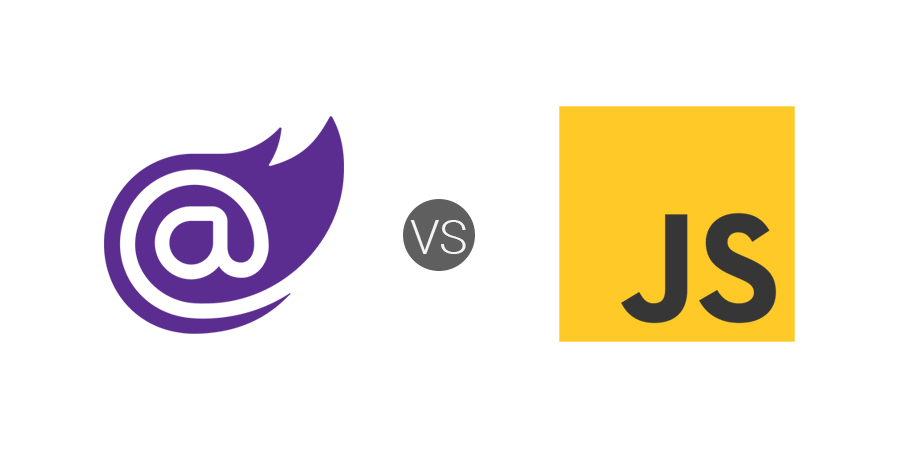Let’s examine if Blazor should replace JavaScript on your next web project.

If you’re a web developer, it’s likely that you’ve heard someone in your inner circle raving about Blazor WebAssembly (or perhaps you are that someone). It’s also likely that during one of these ravings the inevitable comparison between Blazor and JavaScript is made. Since we developers are often passionate about our framework(s) of choice, it comes as no surprise that here at Emergent Software we’ve overheard a growing number of our talented developers offer up compelling cases as to why they prefer to use Blazor over JavaScript whenever the opportunity arises.
In this post, we’ll break down both Blazor and JavaScript, and highlight the positive aspects of each as well as which one we believe to be better suited to web development projects in the 2023 landscape.
TL;DR: Is Blazor better than JavaScript? Well, it depends...
What is Blazor?
Blazor (Browser + Razor) is a framework created by Microsoft that allows developers to build interactive client-side web UIs using C#, removing the need to know how to code in JavaScript.
Blazor utilizes .NET at its core, there is a large ecosystem of existing libraries to tap into as well as rock-solid performance, reliability, and security that we’ve come to expect from 20 years of ASP.NET.
What are the features of Blazor?
Microsoft boasts a long list of Blazor features , but some of the more notable are:
Ability to create rich interactive UIs using C# (rather than requiring developer knowledge in both C# and JavaScript to do the same).
Share server-side and client-side app logic written in .NET.
Render the UI as HTML and CSS for wide browser support, including mobile browsers.
Integrate with modern hosting platforms, such as Docker.
Ability to build hybrid desktop and mobile apps with .NET and Blazor.
What are the disadvantages of Blazor?
At the time of this post, Blazor’s main disadvantage when compared to JavaScript is community size and engagement. While Microsoft has pushed development frameworks in the past (remember Silverlight, anyone?), some have failed to catch on in a meaningful way. For Blazor to truly succeed, it’s userbase needs to continue to grow and produce interesting use cases.
What is JavaScript?
JavaScript is a front-end programming language for the web, first appearing in 1995. JavaScript is a core framework which often appears alongside HTML and CSS. It has been estimated that over 97% of websites use JavaScript on the client side for web behavior (source). Due to its tremendous popularity, all major web browsers utilize dedicated JavaScript engines to execute code on user’s devices. The three most common JavaScript frameworks are currently:
React.js – An open-source, client-side library developed by Facebook. It is simple, scalable, and often used to create mobile applications.
Angular.js – Developed by Google, this open-source front-end web framework claimed to be what HTML would have been, had it been designed for building web-apps and boasted an environment that is extraordinarily expressive, readable, and quick to develop in. Unfortunately, support ended in July 2021.
Vue.js – Authored by Evan You and company, this open-source framework It is lightweight and known for it’s simple integration.
Note: We won’t be diving any further into the specifics of the JavaScript frameworks above in this post, but we plan to in future blog posts. Stay tuned!
What are the features of JavaScript?
Due to its overwhelming popularity in web and app development, there are a plethora of existing JavaScript libraries and communities to tap into for prewritten code snippets and support. To be frank, the JavaScript ecosystem has been, and continues to be, a booming area of web and app development. Additionally, JavaScript offers the following:
The language is easy to understand and learn.
Interoperable and works perfectly with other languages.
Third party add-ons offer a wide range of extended functionality.
Versatile in front-end as well as back-end development.
What are the disadvantages of JavaScript?
Let’s be clear- there is nothing inherently bad about JavaScript as a programming language. It’s just that when compared to newer alternatives, JavaScript is starting to show its age. This is especially true when taking client-side security and browser support into consideration. Poorly coded JavaScript is ripe to be exploited and while server-side scripts produce the same output, browsers will sometimes interpret the code differently.
When to use Blazor instead of JavaScript
Deciding whether to use Blazor WebAssembly instead of one of the many JavaScript frameworks readily available largely depends on your team’s experience and comfort level with learning a new language. If you or your team is more comfortable coding in C# vs JavaScript, Blazor is a solid option for you. Keep in mind, though, that Blazor’s developer community is relatively small and its knowledge base is still maturing. A team who already has a solid grasp of JavaScript and project constraints like timeline or budget may decide to avoid the hassle of learning a new framework and stick to one of the tried and true JavaScript Frameworks available.
Finally, developers who have the time and desire to learn new technology should feel confident giving Blazor a shot at this point. Our team at Emergent Software has numerous successful Blazor projects under our belts and will continue to leverage it on projects Blazor fits well with (and we’re always hiring – check out our careers page).
The verdict: Is Blazor is better than JavaScript?
While there’s little doubt to us that with each new release Blazor will continue to grow in popularity (and for good reason, too), we don’t see Blazor dethroning JavaScript in overall adoption any time soon. Even though Blazor has many clear and distinct advantages over JavaScript, JavaScript and its multiple, well-used frameworks that have stood the test of time, are here to stay for years to come. That said, the future appears to be bright for Blazor and we look forward to utilizing it on projects with goals that align well to what Blazor brings to the table.
Do you have an upcoming web development project? Get in touch for a free consultation.





